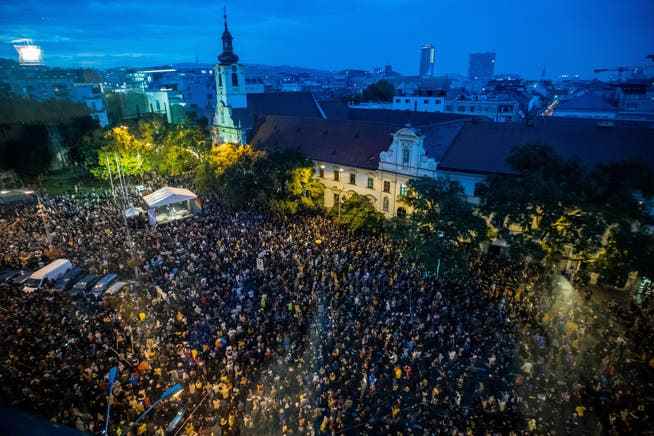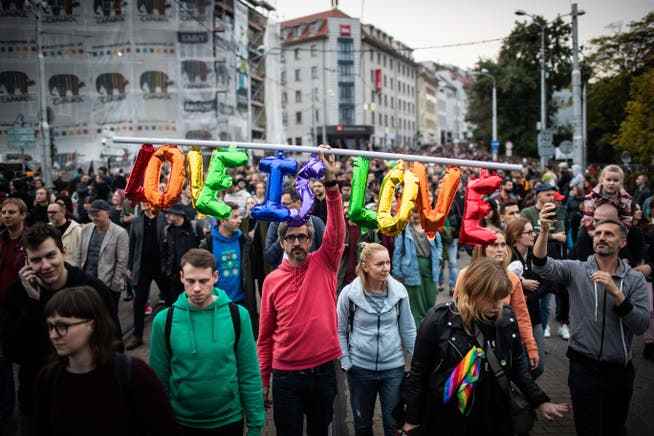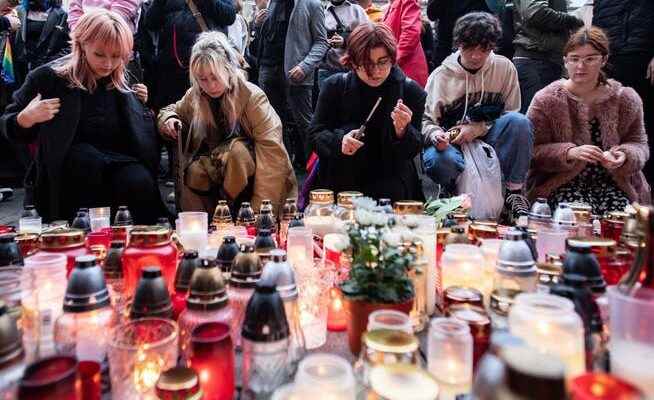The attack by a youth on a well-known meeting place for sexual minorities leads to mass demonstrations in which the heads of state are also represented. But Slovaks wonder if the country’s political climate is contributing to radicalization.
Candles in front of the “Teplaren” bar in Bratislava.
Up to 20 000 people demonstrated against hate and violence on Friday evening in the Slovak capital Bratislava. They commemorated the two men who were shot dead two days earlier at a bar where gay, lesbian, bisexual and trans people (LGBT) meet. One employee survived injured. The 19-year-old gunman, who eyewitnesses said fired ten shots, was found dead in a park on Thursday morning after committing suicide.
The police consider the act to be a hate crime against sexual minorities. This is supported not only by the fact that the bar was a well-known center for the LGBT community, but also by the killer’s statements on social networks: According to media reports he left an anti-Semitic and homophobic manifesto in which he named the terrorist Anders Breivik and the National Socialist Adolf Eichmann as role models. Shortly before his death, he wrote that he had no sympathy for his victims.
Hot political iron
The Slovak state leadership marched at the commemoration event to send a sign of solidarity. “I’m sorry you can’t feel safe,” President Zuzana Caputova told the crowd, apparently shaken. “But you belong here, you are valuable to our society.” She had the rainbow flag hoisted over her official residence.

Thousands of people demonstrate in Bratislava: The attack on the bar causes horror in Slovakia.
Prime Minister Eduard Heger also took part in the demonstration with such a flag. However, he did not make a speech – probably because he had previously said in his condemnation of the attack that nobody should have to fear because of their “lifestyle”. In doing so, he unconsciously chose the words of those who claim that homosexuality is an individual choice – and not a fundamental element of a person’s being. Heger later apologizedafter being criticized for his statement.
I strongly condem a murder of two young people shot dead in #Bratislava last night by a radicalized teenager. No form of white supremacy, racism and #extremism against communities, incl. #LGBTI, can be tolerated. We will fight disinfo channels spreading hate & protect minorities
— Eduard Heger (@eduardheger) October 13, 2022
However, the remark also illustrates how deeply entrenched skepticism about sexual minorities remains in Slovakia. The fight against the alleged “gender ideology” is given high priority not only by numerous politicians, but also by the church. At the beginning of October, for example, parliament rejected a bill banning rainbow flags from state-owned buildings. It was brought in by a member of parliament from Heger’s party, of all people Olano.
The initiative is part of a broader socio-political conflict. In recent years, for example, Parliament voted against twice by just one vote Restrictions on the Right to Abortion. Pressure from the arch-conservative Catholic Church also led to MPs rejecting ratification of the Istanbul Convention in 2019. This makes gay marriage possibleunder the pretext of protecting women’s rights, was one of the reasons given.
Radical Currents on the Internet
Even if physical attacks on sexual minorities in Slovakia are an exception, their representatives complain about an atmosphere of hatred, which prevails especially in the digital space. According to the Slovak Spectator website one in six disparaging comments last year was directed at this group. Even after last week’s bar attack, users applauded the killer, others put laughing emoticons under the police announcement on Facebook.
«Hate is the norm, vulgarity is an everyday part of our vocabulary», This is how the owner of the “Teplaren” bar commented on the attack. Roman Samotny believes that it only takes a single step from the symbolic to the physical attempt to wipe out sexual minorities from the public eye. “Many say LGBTI+ people represent an ideology. But I saw my friends’ blood on the sidewalk, not an ideology.”

“Love is love” was one of the slogans of the demonstration on Friday.
The murderer, whom Heger described as a “radicalized young person”, may have received some of his ideas from his parents’ home. Apparently he also used the weapon of his father, who ran for the far-right Vlast party in the 2020 elections, but failed in front of the voters. With the LSNS, however, there is a neo-fascist party with pointedly pro-Russian positions in the National Council.
These forces, which the security authorities say Moscow is supporting with money and disinformation campaigns, are experiencing an upswing in Slovakia due to the economic and political instability resulting from the Ukraine war. This definitely has the potential to endanger the state: Significantly, the perpetrator had according to the website aktuality.sk initially chose Prime Minister Heger as a target, whom he described in his manifesto as an “American puppet”. When the assassination failed, he directed his hatred at a less well-defended target.
